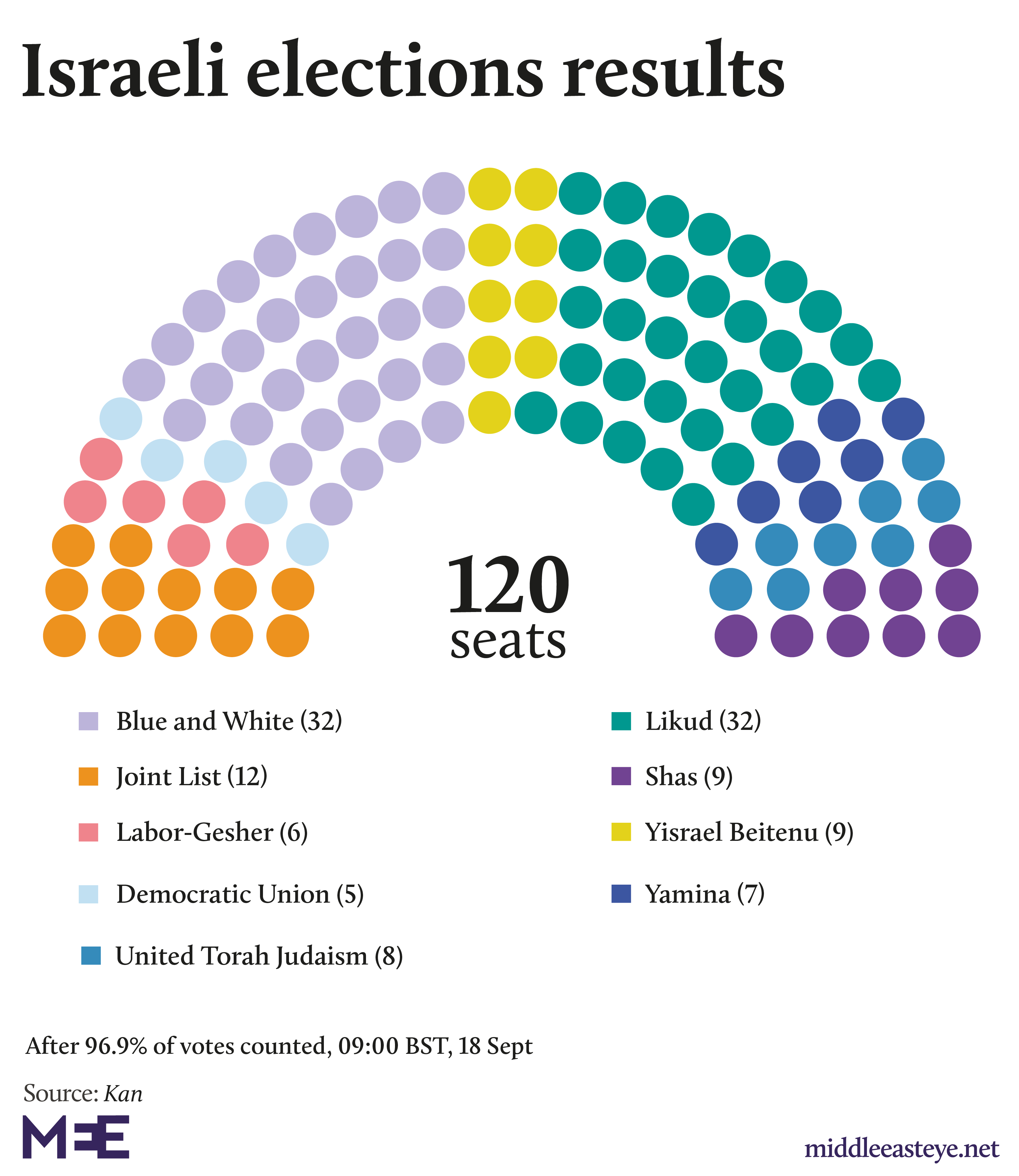Israel prepares for unity government negotiations after deadlocked election

Israel faced the proposition of a unity government on Wednesday, with neither Prime Minister Benjamin Netanyahu nor his challenger Benny Gantz able to form a coalition.
With 96.9 percent of the votes counted, Gantz’s Blue and White and Netanyahu’s Likud were neck and neck with 32 seats. The Palestinian Joint List has gained 12 seats, making it the third-largest party.
Netanyahu has meanwhile cancelled his planned visit to New York to attend the United Nations General Assembly due to the "political context in the country", sources in his office told AFP news agency.
Avigdor Lieberman, who could swing the election in each candidate’s favour with the nine seats his Yisrael Beiteinu party has won, called for a unity government.
"The picture is clear... There is only one option and it's a broad liberal unity government," he said on Wednesday morning, referring to a coalition that would include Likud, Blue and White and Yisrael Beiteinu.
Stay informed with MEE's newsletters
Sign up to get the latest alerts, insights and analysis, starting with Turkey Unpacked
Gantz intimated he was open to the idea, and said while he waited for the final results he "wishes Israel a good and desirable unity government”.
"We will act to form a broad unity government that will express the will of the people," the former army chief told supporters in Tel Aviv.
"We will begin negotiations and I will speak with everyone."
Once the results are in, all eyes turn to President Reuven Rivlin, who is likely to meet with Netanyahu and Gantz following consultations with the smaller parties.
For Netanyahu, remaining prime minister, at least temporarily, could be a matter of his freedom.
The premier, who is Israel’s longest serving prime minister and has been in power continuously for a decade, is plagued by three corruption cases.
Netanyahu had sought to form a strong right-wing government that could have passed a bill handing him immunity, though that now looks highly unlikely.
In two weeks’ time he faces a hearing on them, and Netanyahu will seek to remain in power while he battles the charges.
Gantz, however, also seeks the premiership and has long said Netanyahu should step aside while he fights the allegations. What a future power-sharing deal would look like is uncertain.
Rise in the Palestinian vote
There weren’t many winners emerging on Wednesday. Ayelet Shaked’s far-right Yamina party took just eight seats after being projected winning around 13 a few weeks ago.
A Yamina source told Israeli newspaper Haaretz that she was preparing to sit in the opposition.
One clear victor, however, was the Joint List.
The slate of Palestinian parties’ leader, Ayman Odeh, said in the event of a unity government he would consider becoming leader of the official opposition.
In that role Odeh would meet weekly with the prime minister and receive high-level security briefings.
Odeh also said he had spoken to former army chief Gantz, and would likely recommend him as premier to Rivlin. “However, we have clear conditions and based on them we will decide. We want to replace Netanyahu,” he said.
The Palestinian parties increased their share of Israel’s parliament, the Knesset, by three seats.
Netanyahu had used the threat that Palestinian citizens of Israel would vote in high numbers as a tactic to energise his right-wing base.
However it appeared to have the opposite effect and spur Palestinians to the polling booths: partial results indicated that the Arab vote had increased to 60 percent from 50 percent in April’s inconclusive election.
"We voted in droves," the Joint List’s Ahmed Tibi tweeted, in reference to Netanyahu’s infamous claim in the 2015 election.
"The main difference in this vote is the turnout among Arab citizens," Odeh said. "There's no doubt that this is what made the difference. Without that, Netanyahu would already be prime minister."
Netanyahu’s last public appearance was in the early hours of Wednesday morning.
Speaking hoarsely after a tough campaign, the embattled prime minister said he was prepared to form a "strong Zionist government".
Netanyahu is set to make an announcement at the Likud headquarters at 6pm Jerusalem time.
Middle East Eye delivers independent and unrivalled coverage and analysis of the Middle East, North Africa and beyond. To learn more about republishing this content and the associated fees, please fill out this form. More about MEE can be found here.







